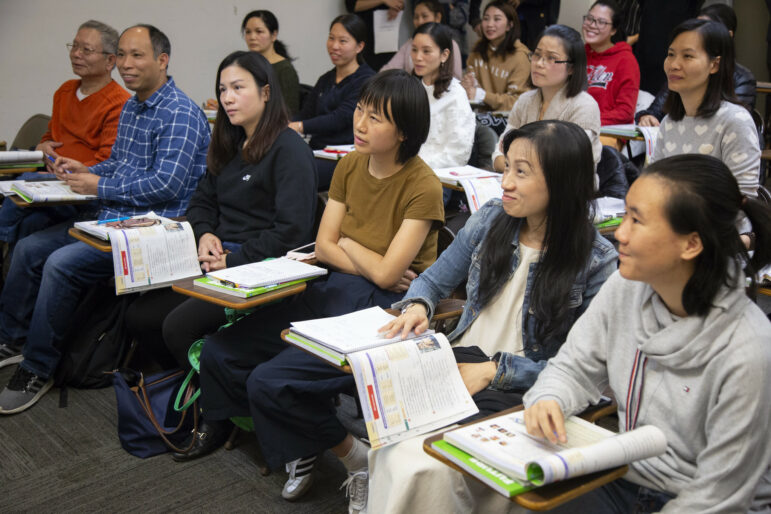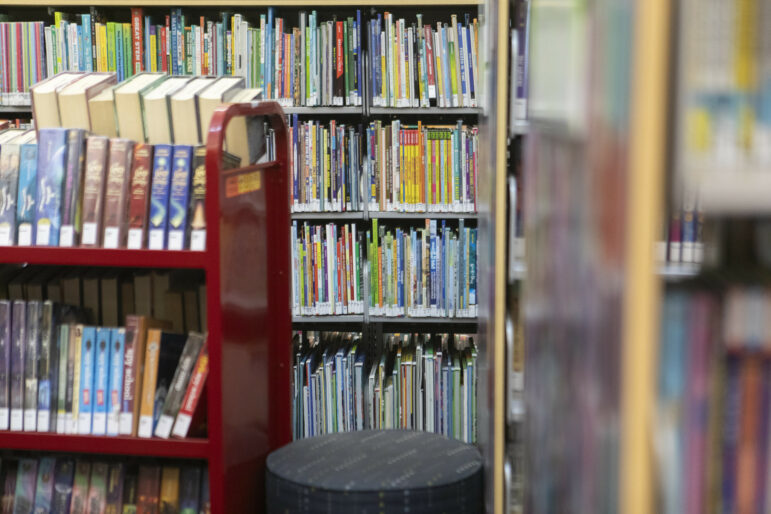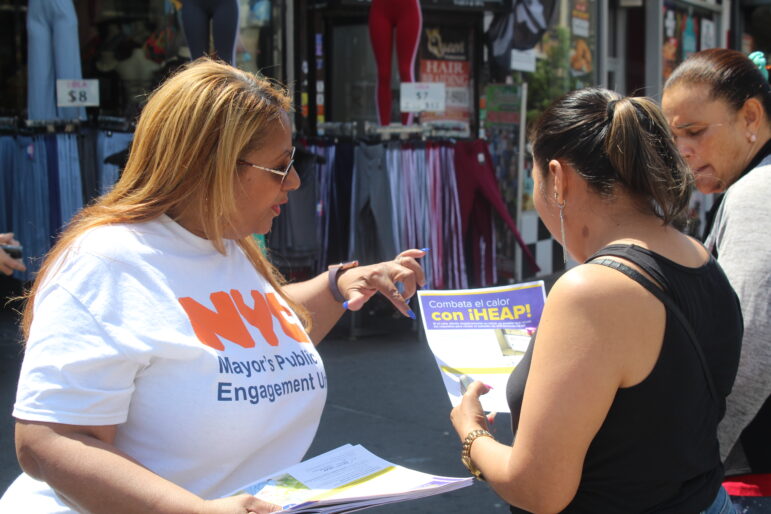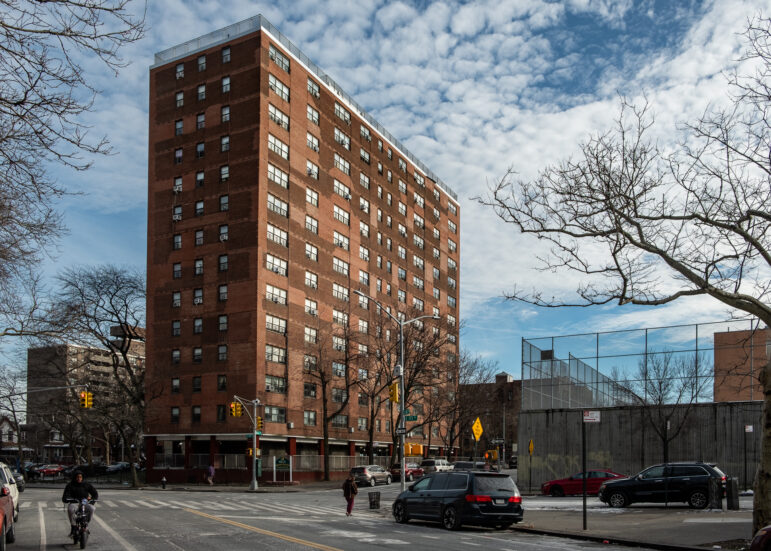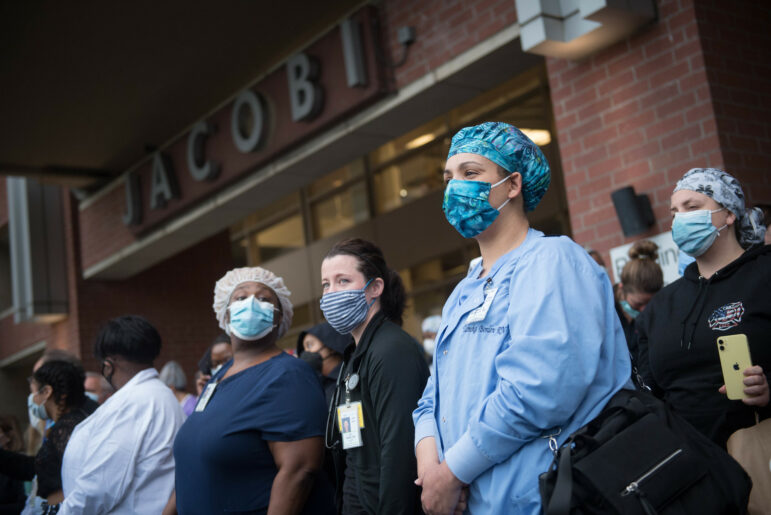Voter education is one hurdle. But a bigger one, advocates say, is the cumbersome voting process itself for people behind bars. “There are impediments and obstacles that create real and serious concerns about the viability of an absentee ballot,” said Cesar Ruiz, associate counsel at LatinoJustice.
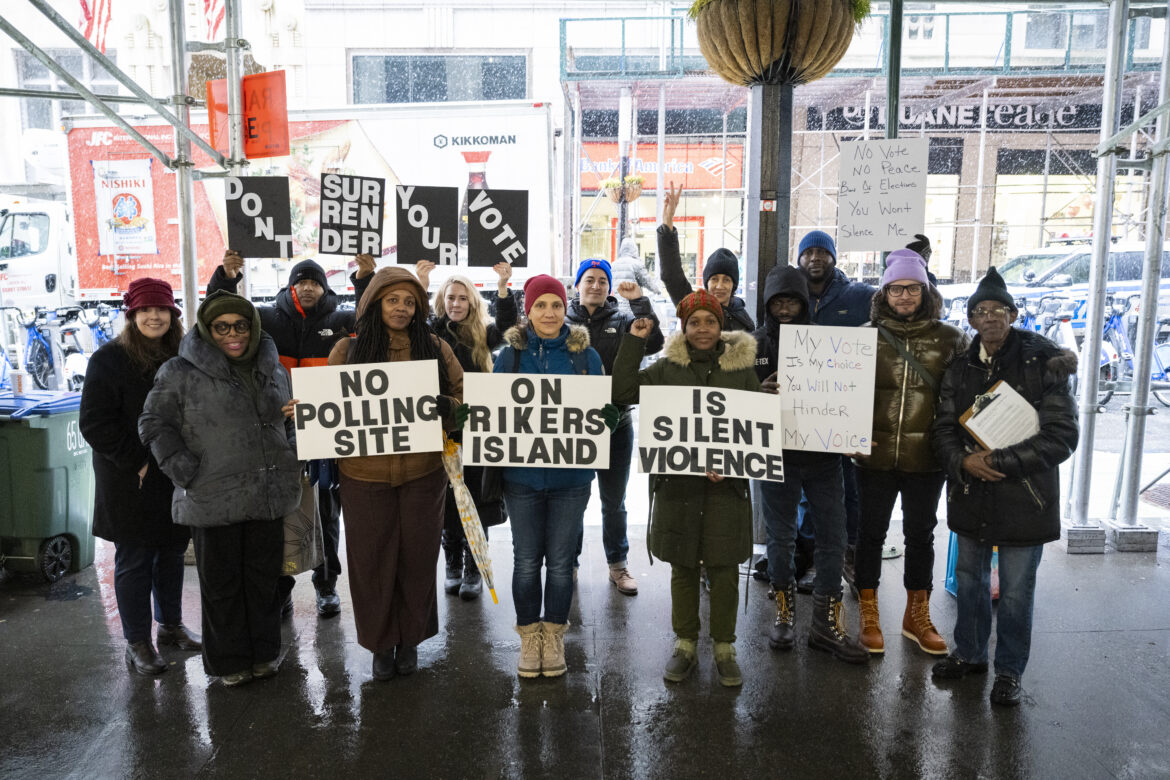
Mikel Bragham
Members of the Vote in NYC Jails Coalition rallying for a Rikers Island-based poll site February.With this year’s presidential election expected to be a neck and neck competition between President Joe Biden and former President Donald Trump, every vote will matter. Mike John, who is voting for the first time, is proud that he’ll be able to weigh in.
During the nine years he was incarcerated in New York State’s prison system, John, 33, said he never had a full grasp on what his voting rights would be when he was released. “The individuals that were part of the carceral system, they looked at it as a myth,” he said.
All individuals convicted of a felony lose their right to vote while serving time in New York State correctional facilities. However, they now regain that right once they are released, as a result of a law passed in 2021.
But John says that information was never relayed to him or others during his time behind bars. When he was released in February of this year, he finally got those answers. “It only took nine years to understand if it was a myth enough or not,” he said.
According to the Department of Corrections and Community Supervision (DOCCS), upon release, individuals incarcerated at state prisons go through what’s called the Transitional Services Program, during which they are given the opportunity to complete a voter registration form.
Those leaving local jails are also given voter registration forms, thanks to a law passed in fall 2023 by Assemblymember Edward Gibbs and State Sen. Jamaal T. Bailey, part of a larger legislative package to protect and expand voting rights. Gibbs, who was formerly incarcerated himself, said the law is “near and dear to his heart.”
While registering people to vote is important, it’s just the first step, according to the Vote in NYC Jails Coalition, which says that even after years of advocacy and legislative advancements, serious gaps remain when it comes to voting education and access for incarcerated people.
Unlike state prisons, people can still vote in New York jails if they are awaiting trial or if they have a misdemeanor charge. About nine out of 10 people in custody on Rikers Island, for example, have not yet been convicted of a crime, according to The Center for Justice Innovation.
“Rikers has a long history of discrimination, of dehumanization, and just abhorrent conditions. When you talk about the right to vote, that can seem not only so foreign, but so far removed from the realities that people are experiencing,” said Cesar Ruiz, associate counsel at LatinoJustice.
“These people are very much interested in getting involved in politics,” Ruiz added, but most are unaware of their right to vote while awaiting trial.
One person who works in criminal justice and who spoke to City Limits on background said that incarcerated people often don’t receive accurate information about their voting rights, and aren’t always up to speed on individual candidates or races. “I was only incarcerated myself and information is really hidden from you,” the source said.
In response to request for comment, a spokesperson from the city’s Department of Corrections (DOC) told City Limits that the agency provides non-partisan information about voting and upcoming elections, voter registration forms in various languages, absentee ballot applications, and offers assistance in filling out forms upon request.
Voter education is one hurdle. But a bigger one, advocates say, is the cumbersome voting process itself. Because there is no physical polling site in New York City jails and people housed there hail from many different election districts, they have to request an absentee ballot if they want to vote.
The DOC then has to pick up those ballots in person from the New York City Board of Elections (BOE), deliver them to individual voters, have them fill it out, and then return the ballots to the BOE. The catch, according to advocates: there is only one person designated to do all of the ballot pickup and dropoff, a tall order when you consider the New York City’s jail population currently sits at over 6,300 people.
The circuitous process results in too many absentee ballot requests and completed ballots being rejected. Rigodis Appling, a staff attorney with the Legal Aid Society, said local BOE offices don’t always give the reason for the rejection. When it does, it could be because the forms are not filled out correctly, are missing certain information like the voter’s political party, or because the person who requested the ballot has already left Rikers.
But from the advocates’ point of view, the rejections often feel arbitrary. “With each step, you kind of see that there are impediments and obstacles that create real and serious concerns about the viability of an absentee ballot,” said Ruiz.
A spokesperson from DOC said they cannot comment on why a ballot is rejected and that they’re only in charge of voter education and delivery.
During New York’s April 2 presidential primary, there were 296 absentee ballot requests, but the DOC only received 171, meaning more than a third were rejected, according to Appling.
The fact that the majority of the city’s jail population is people of color raises the stakes, advocates say. Black and Hispanic people made up almost 90 percent of New York City’s more than 16,000 jail admissions in 2021, according to a report from John Jay College’s Data Collaborative for Justice.
“We are systematically disenfranchising Black and Latinx people, we should be really clear about that,” Appling said.
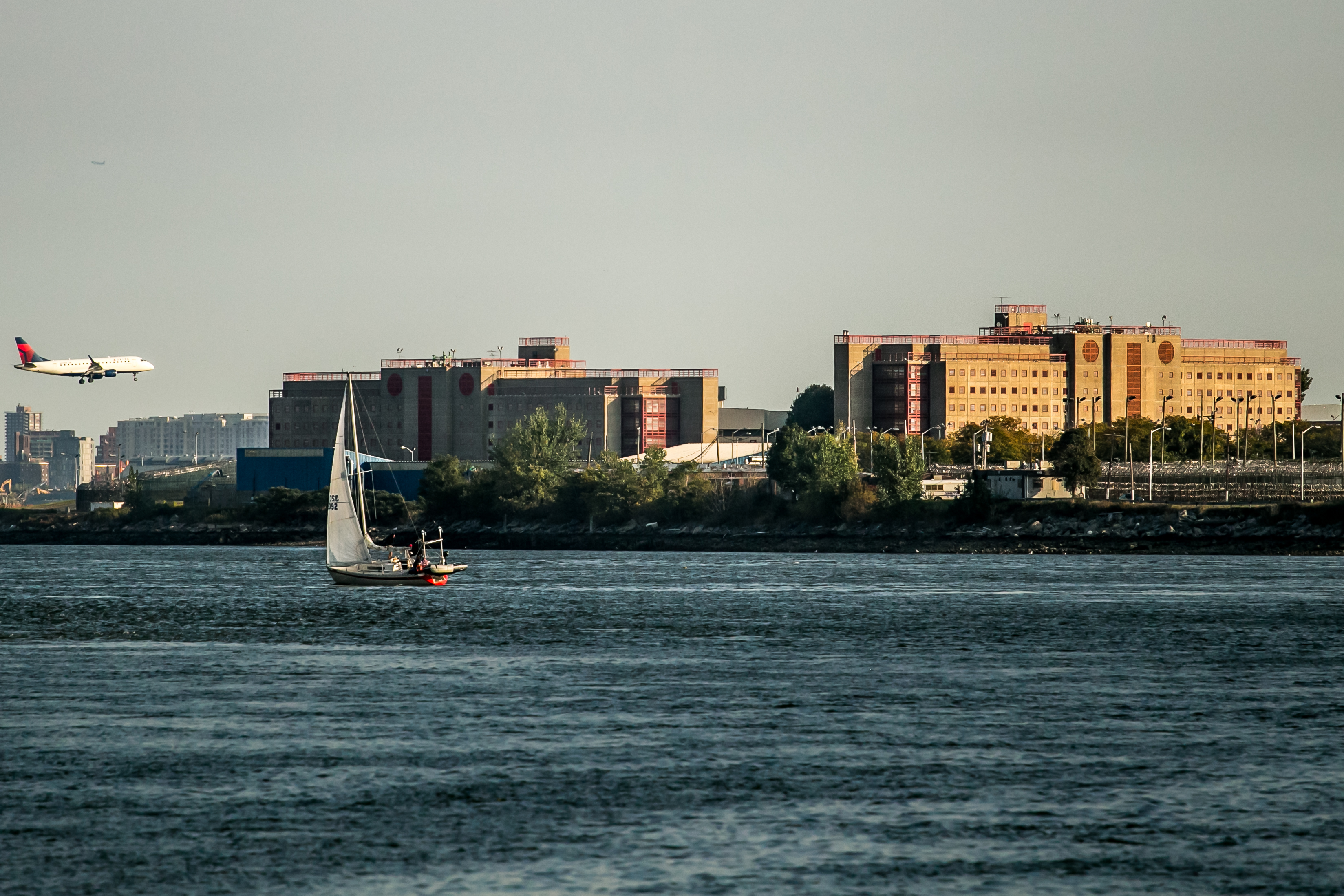
Adi Talwar
Rikers Island.According to a DOC spokesperson, for that same primary, the department provided 119 completed ballots to the BOE. “It is important to keep in mind that we submitted many more applications but some Persons in Custody (PICs) don’t get ballots for various reasons,” the spokesperson said.
An absentee ballot could get rejected if a person doesn’t select a party, the spokesperson explained, while those who do get a ballot may not be able to fill it out if they get transferred to state prison or released into the community before it arrives.
If a completed absentee ballot has any sort of error, the BOE is supposed to give the person an opportunity to cure it. But that isn’t always the case.
“That process has never happened at Rikers,” said Appling.
To address these perennial issues, LatinoJustice, along with the Vote in NYC Jails Coalition, has been working with lawmakers on a statewide bill that would establish a polling site in Rikers and other local detention facilities. Direct access to voting would streamline the process and reduce procedural hiccups, they say. The bill would also create an enforcement mechanism for the BOE and DOC.
Ruiz says the coalition plans to introduce it during next year’s legislative session.
“In this moment of rampant voter suppression that swept the South…we firmly believe that this is one of the ways that [New York] can lead,” he said.
This story was produced as part of the 2024 Elections Reporting Mentorship, organized by the Center for Community Media and funded by the NYC Mayor’s Office of Media and Entertainment.
To reach the editor, contact Jeanmarie@citylimits.org
Want to republish this story? Find City Limits’ reprint policy here.


